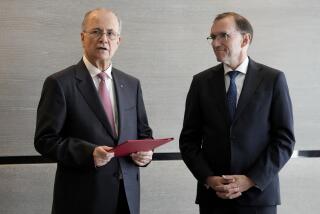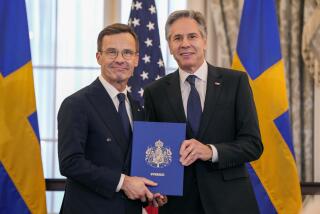Sweden, Finland, Austria OK Terms for EU Membership
- Share via
BRUSSELS — After more than 30 hours of continuous negotiations, Sweden, Finland and Austria agreed Tuesday to terms that would allow them to join the European Union next New Year’s Day.
While the terms of the negotiated entry must still pass through an arduous ratification process, Tuesday’s accords effectively set in motion the EU’s first expansion since its 12 member states committed themselves to the goal of full political and economic union more than two years ago.
“This is the most important agreement Sweden has entered this century,” said Swedish Prime Minister Carl Bildt in a radio interview from Stockholm.
Finland’s foreign trade minister, Pertti Salolainen, who helped negotiate his country’s entry package, called the accord historic.
The addition of Finland would give the EU, formerly known as the European Community, its first common frontier with Russia.
As exhausted negotiators celebrated the group’s hard-won accords with the two Nordic countries and Austria, EU officials said negotiations with a fourth country, Norway, seemed stalled and will probably be adjourned until early next week.
The EU had set a deadline of midnight Monday to complete the year-old talks to leave enough time to get through the ratification process by the formal entry date of Jan. 1. The terms of accession must be approved by the European Parliament in Strasbourg, France, and the parliaments of the countries in question, and then subjected to national referendums.
If talks with Norway succeed and all four eventually join, their entry will make the EU the world’s largest and richest single consumer market, with a total population of 375 million.
Aside from adding to the EU’s size, a successful expansion would have several other important ramifications.
Entry of four of the continent’s richest, most stable democracies would give new strength to the EU at a time when its members are struggling with immense economic difficulties. It would pave the way for nations of Nordic Europe--in addition to Denmark, already a member--to join the push toward the EU’s stated goal of full political and monetary union.
“Countries must come together that belong together,” summed up Foreign Minister Klaus Kinkel of Germany, the EU’s most populous member.
Perhaps more important, however, a successful round of enlargement negotiations would provide a much-needed psychological boost for those fighting to contain the revival of ultranationalism that has gathered strength in several European countries.
Indeed, for many, the crucial drama now unfolding in Europe is the struggle of those trying to sustain the momentum of the dream of European unity in the face of growing economic strains and the small but virulent neo-fascist movements that feed so well on such misery.
The entry of Austria and the Nordic countries is also seen as a final necessary step before the EU reaches out to accept some of the new democracies in formerly Communist Europe.
But in contrast to the lofty nature of the stakes involved, the talks with all four countries have dealt mainly with the hard, narrow issues of economic self-interest.
The talks with Sweden, for example, succeeded only when EU negotiators agreed to a 3% increase in Sweden’s milk quota and $66 million more from the common budget; the accord with Finland was stuck for hours on the level of subsidies the EU would be willing to provide the Finnish food processing industry.
Negotiations with Austria had bogged down over its insistence on restrictions through 2004 on heavy truck traffic roaring across its Alpine roads. Despite French misgivings, the EU agreed to let Austria limit truck traffic until 2001.
More to Read
Sign up for Essential California
The most important California stories and recommendations in your inbox every morning.
You may occasionally receive promotional content from the Los Angeles Times.













